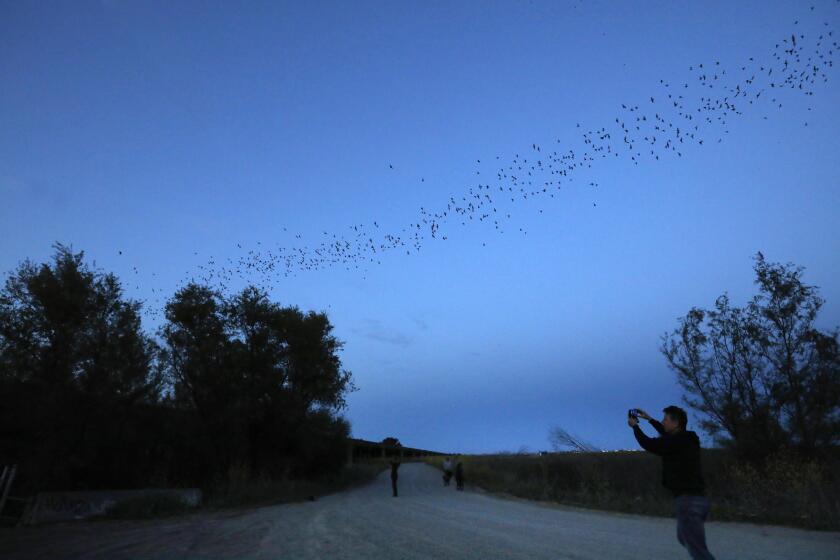Tough Orange County Anti-Gang Law Voided
SANTA ANA — An Orange County Superior Court judge on Monday dissolved a temporary court order that had prohibited four dozen members of a Westminster gang from associating with each other, saying it violated the U.S. Constitution’s guarantee of privacy.
Judge Richard J. Beacom, while saying he was sympathetic to Westminster’s effort to fight its growing gang problems, struck down the anti-gang ban as an “impermissible invasion of privacy” under the First Amendment.
Although not binding, Beacom’s ruling nonetheless supports arguments by defense attorneys in the San Fernando Valley who are seeking to overturn similar anti-gang bans in Burbank and Panorama City.
The court order in Westminster was one of a relatively few court orders that have been issued in Southern California to crack down on gangs by making it a crime for them to commit normally legal acts. The order was significantly stronger than a well-publicized court order now in effect against a Panorama City street gang because it banned even simple association.
The 22-point Panorama City injunction was granted in April by a Van Nuys Superior Court judge against 500 unnamed members of the Blythe Street gang. It makes it a crime for gang members to engage in activities such as standing on rooftops or possessing portable telephones.
Los Angeles City Atty. James Hahn’s office will review the Orange County ruling to see whether it affects the Blythe Street injunction, spokesman Ted Goldstein said.
“Right now, the Los Angeles police see the court injunction in the Blythe Street area as a boon to bringing a sense of order,” Goldstein said.
An alleged Blythe Street gang member, Jessie (Speedy) Gonzalez, was convicted of violating the injunction last week for activities that included possessing a pager and a glass bottle.
Deputy public defender Alex Ricciardulli said his office plans to appeal the conviction of Gonzalez--who denies being a gang member--on the grounds that the restrictions are unconstitutional. Gonzalez was sentenced to 90 days in jail and three years of probation.
If successful, Gonzalez’s appeal would be binding on courts statewide, Ricciardulli said.
Ricciardulli’s office is also defending two Burbank men who are charged with violating a city injunction similar to the Westminster order that forbids alleged gang members from appearing together in public.
“They were arrested for standing on Elmwood Avenue, where the injunction is being enforced, for being in the presence of another gang member,” Ricciardulli said. “That is pretty Draconian.”
Beacom’s ruling in Westminster case on Monday shows that making misdemeanor crimes out of normally legal activities defies common sense, Ricciardulli said.
Beacom granted a temporary order two months ago banning members of Westminster’s West Trece gang from from “standing, sitting, walking, driving, gathering or appearing anywhere in public view” with each other in a 25-square-block area of Westminster. Anyone disobeying the order was subject to a charge of criminal contempt and subject to six months in jail if convicted.
On Monday, however, Beacom declined to make the order permanent, despite his feelings that gang activity has put society “on the edge of anarchy . . . near a breaking point.”
Westminster city officials said they were disappointed by the ruling and may appeal it.
Civil libertarians cheered the decision as an important affirmation of constitutional principles--even in a community wracked by violence.
Deputy Dist. Atty. John Anderson vowed that civil court orders “will be tried again” in Orange County.
Anderson said that although none of the defendants had been cited for violating the ban since it went into effect, gang activity in the area dropped almost to zero.
Said one of the defendants, Cesar Garcia, 18, an admitted member of the gang: “I knew they couldn’t take our rights like that . . . just to keep us from hanging out.”
A city ordinance banning gang members from a San Fernando park was allowed to expire last year before facing a court ruling on its constitutionality, because city officials said it was no longer needed.
The controversial city law, which was challenged by the ACLU, was put into effect after a woman and her three small children were wounded by cross-fire between rivals at Las Palmas Park in 1991.
Pinsky reported from Orange County and Enriquez from the San Fernando Valley.
More to Read
Sign up for Essential California
The most important California stories and recommendations in your inbox every morning.
You may occasionally receive promotional content from the Los Angeles Times.










